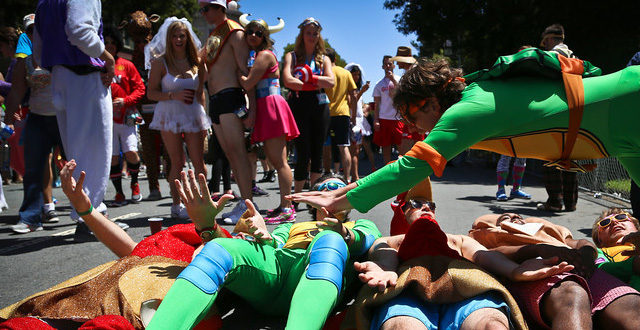Movie Review: ‘Labor Day’ Barely Misses The Mark

It appears writer/director Jason Reitman hits all the right notes in his adaptation of Joyce Maynard’s novel Labor Day, and yet it just misses the mark. Beautiful to look at, and full of great performances — namely from Kate Winslet, Josh Brolin, and Gatlin Griffith — it never lands the dramatic impact Reitman is clearly going for. Known for his works with writer Diably Cody — Juno and the darker, more mature but no less funny Young Adult — he came into his own as both a writer and director with Up In The Air, a Walter Kirn adaptation, that earned him raves. While more of a drama than his past efforts, Thank You For Smoking included (again another adaptation), Up In The Air still retained a fair amount of humor. With Labor Day, however, Reitman takes a stab at melodrama with mixed, but worthy results.
Much of the film takes place over Labor Day weekend in 1987, centering on Henry Wheeler (Gatlin Griffith) and his emotionally fragile mother Adele (Kate Winslet). While his father Gerald (Clark Gregg) cut and run some years prior due to Adele’s instability, and started a new family, Henry feels a stronger bond with his mother, despite her near-reclusiveness. During their monthly outing for supplies, they come into contact with Frank Chambers (Josh Brolin) who asks, before politely requesting, that they drive him to their house to help with some injuries. It’s not long before he freely tells them that he’s an escaped convict, but quick to note that he’s not the man portrayed in the media. What at first begins as a clear cut hostage situation, although one where Frank politely ties up Adele to keep up appearances for any possible police intrusion, Henry and Adele slowly let their guard down. Perhaps it’s because he begins doing all the hard labor around the house that needs doing — waxing the floor, cleaning the gutters, changing the car’s oil — but that’s only the manifestation of Frank’s good heart.
It doesn’t take long for Adele and Frank to establish a mutual attraction and for him to establish a fatherly relationship with Henry, teaching him to throw and hit a baseball. It all sounds very Lifetime movie — a detraction it’s sure to get by many — and, honestly, it’s not a far off comparison. But Reitman doesn’t let this makeshift family bloom without shots of hesitation on the faces of Adele and Henry, only giving way to acceptance as they understand Frank won’t harm them. Instead, Reitman has a hard time holding everything together. Narrated by an elder Henry (Toby Maguire) it’s unclear who the story is about. Is it about Henry’s ascension into adulthood through that weekend? Or is it about how Adele was able to open herself back up and find love? Ostensibly, it’s about how both are connected but Reitman isn’t ever able to combine the two in a satisfying way.
Similarly, while Winslet is able to play distressed housewife better than anyone, and Brolin exudes a guarded charm as Frank, frankly the two seem to lack chemistry. Part of that could be that Winslet dials the anxiety up a bit too high to ever resemble a fully formed character. But more likely, it’s due to Reitman’s resistance in deciding what the story is really about. While Adele and Frank share looks of longing around Henry, their physicality happens only behind closed doors heard faintly through Henry’s ears as he tries to sleep.
And that may be the biggest issue — Reitman sets it up as a coming-of-age for Henry but still focuses heavily on the Adele, and thus Frank, without fully committing to the film being through Henry’s point of view. This is also complicated through flashbacks leading up to Frank’s crime where a young Frank comes across a young blonde (who almost purposefully resembles Adele), but adds little to the actual characterization of Frank. Brolin does that all himself, and he doesn’t need the help. If only Reitman could have paired down the film to its essentials and established a clear path, the film would have a much stronger punch and a more satisfying ending. As it stands it’s far from terrible, but the gnawing sense that it could be so much better — and that Reitman can do better — leaves a bitter aftertaste, rather than bittersweet.
Rating: 3.5 out of 5






